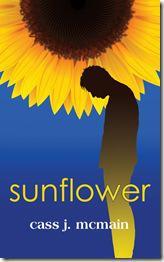Sunflower by Cass J. McMain

Hardback (203 x 127mm):
£19.99 / USD $29.99
ISBN: 978-1-909374-44-7
Paperback (203 x 127mm):
£11.99 / USD $19.99
ISBN: 978-1-909374-45-4
Kindle
£3.99 / USD $5.99
ISBN: 978-1-909374-46-1
ePub
£3.99 / USD $5.99
ISBN: 978-1-909374-47-8
BIC Code: FA
Michael is a metalworker with a name for building good fences. He’s even known by some neighborhood kids as Mr. Fence Man. But he wants to be something more: an artist like his former business partner, Alex. An artist, like his girlfriend, Jess, wants him to be. The commissions are starting to come in, and along with steady work making fences, things are looking good. The only problem he has is with his closest neighbor, who won’t allow visitors to pass through a gate between their properties. This dispute becomes a fight and Michael, enraged, makes a wrong choice.
Haunted by the result of his choice, Michael starts to fall apart: a death weighs down on him, exposing the weaknesses in the persona he was creating for himself, the weaknesses at the heart of him.
Sunflower is a story about a man having a bad day and making one bad choice. But underneath that, it also about his coming to terms with himself: who he is – and who he is not. Ultimately, Sunflower is about how we define ourselves as people, and how we seek to be what we are not.
An extraordinary and beautiful novel.
—
Editor’s Review:
I was pointed in the direction of Sunflower by a friend who had seen it on a writing forum. Within a couple of pages I was sure that this was worth reading, and approached Cass through the mutual friend. She duly sent me the manuscript, apparently a little surprised at my interest.
I realised then how long it was – 140,000 words, a real epic. Too long, according to conventional wisdom – surely too long unless it contained suitably epic events and huge cast of characters.
One Saturday late morning I opened the Word document and, seated at my desk, began reading. I read straight through, stopping only for coffee. 140,000 words in one day. Very little happens in the book, to be truthful, and what there is doesn’t happen quickly. Characters? Well, there are maybe three or four who are central, and perhaps a dozen (including a waitress and a salesman who appear for a few lines) in all. The style is simple, and there are no great phrases, no extended analyses, no bravura passages. I felt as though I had read a brief, simple book, and as though I had been immersed in another life.
Above all I knew this should be published.
It is hard, though, to describe or characterise. If it was a painting it would undoubtedly be in the impressionist style – or some midway point between pointillism and the obsessive twisting strokes of Van Gogh. There is a rhythm and a repetition, an extraordinary care with each word, each sentence, each punctuation mark, but it is true art, for one is never aware of the effort nor of the innate skill.
The reader is taken into the lives of the characters, the life, above all, of Michael. Like most lives his is composed of small moments, small worries, and small ambitions; as with most lives there is a fragility to his. The fragility is in part due to a fault line in him – the kind of fault line we all have. One particular small moment has a butterfly effect on the whole; the structure begins to crumble, quietly, almost unnoticed, and a life of quiet desperation emerges.
Throughout there are those moments that strike home and for me there was one particular moment: a telephone call, innocuous and unimportant, that made me stop reading for a little while, so personal was the recognition. There is throughout a kind of gentle descent – and the most gentle dissection of a person one can imagine. Yet in the end this about strength and hope, about life-giving light as well as life-denying darkness.
It is indeed a story of small things and profound truths.
Robert Peett
—

Cass McMain was born in Albuquerque and raised in the far North Valley, among the cottonwoods. Her first love was always houseplants, and she now maintains a house full of them.
Her background as a greenhouse manager led to a long career in garden center management, but when the bottom fell out of the local industry, she took a new path. Or rather, an old path; Cass started writing at the age of six, knocking out stories on her typewriter.
While her love of nature came in part from her father, a man with the heart of a farmer and the soul of a philosopher, much of the writing Cass did as a child was done to please her mother, a woman with the heart of a philosopher, the soul of a demon and the unquenchable thirst of the mind reserved for the brilliant.
Recently, Cass’s writing muse has again been speaking to her: a voice she stopped paying attention to a long time ago. Her plants, some of which she has had since she was nine years old, remain the heart of her life, but now she has a desire to express herself in other ways.
Bowed, but not broken, Cass keeps her eye on the horizon, looking for a greenhouse to manage. Her favorite saying these days is “that was then; this is now.”
An Excerpt from Sunflower:
Michael got home late in the afternoon, and he was worn out. He didn’t feel like working on the Tragedie piece. But if he didn’t do anything on it, he knew Jess would nag at him. Maybe he could sort of review it, without a lot of work. Those guys had taken a lot of energy out of him. He mixed himself a gin and tonic and walked out to the shed.
The piece stared at him. He wondered again why the owner of this restaurant was so determined to have such a somber image as their icon. That reminded him about the curls he was going to try on the cheeks. He set his drink down and took up the coil he had experimented with before. The heat from the torch had definitely brought out some different coloring. Michael decided to give it a shot on a grander scale.
Working with a much larger strip of metal, Michael fashioned a coil about a foot across and two inches thick. To change the color of it he fired up his torch and played the flame across the metal. This gave the coil some irregular markings that brought out depth and made it more interesting. Michael ran his hand along the edge and realized it was dangerously sharp, so he ground down the edges and ran the torch over it again. He doubted anyone would be actually petting the artwork, but it wouldn’t be smart to take the risk.
Once the metal was curled, he welded it to the cheek of the mask, under the left eye. The mouth was unevenly curved by design and as Michael worked he came to the conclusion that the second curl should be placed lower, to follow the direction of the mouth. He stepped back to look at the piece from a distance, and bumped into the table which held his drink. Michael caught the drink before it spilled, and absent-mindedly swallowed it at a gulp. The ice had melted; he had not realized how much time had passed, and it was now after 5:00.
Michael set down the glass again. It can’t be that late, he was thinking, when he heard Jess pull into the driveway. It was indeed that late. He went out to meet her.
She stepped out of the car. Her cotton skirt blew out behind her as she moved toward him, making her look almost like she was floating.
“Hi sweetie,” he called to her. “How was your day?”
“Was OK, how about yours? Get anywhere on your mask?” She caught up to him and gave him a peck on the cheek.
“Yeah, come look at this idea I got,” Michael said enthusiastically. “I really think this helps the piece look less formidable.” He led Jess to the shed.
She looked in at the mask. “The curlicue?” she asked. When Michael nodded, she said “I like it. Doing another on the other side?”
“Yeah,” Michael said. “Down lower though, to keep with the mouth.” He pointed at the spot. “Think it helps?”
Jess agreed that it did make the mask less frightening. “But it still looks mean,” she said. “It isn’t supposed to look mean, it’s supposed to look sad.”
“Well, I don’t know what else I can do,” Michael said. He was irritated, but he tried not to let it show. Easy for her to say, he thought. “What do you think I was trying to do with the curls?”
“Honey, don’t get upset,” Jess replied. “I just mean—well here, why don’t you add some turned down eyebrows?” She took up a notepad nearby and sketched. “Like this.” She held the pad up for Michael to view.
It was perfect. It would only take a couple of hours to do, and it would completely change the piece. Michael was stunned and, he hated to admit, resentful. She did in three seconds what I couldn’t do in three weeks, Michael thought. Just like Alex.
—
Purchase Sunflower from:
http://bookShow.me/1909374458 (this is a new system that should allow whoever clicks on it to reach their local Amazon site)
Barnes & Noble
Waterstones
Foyles

